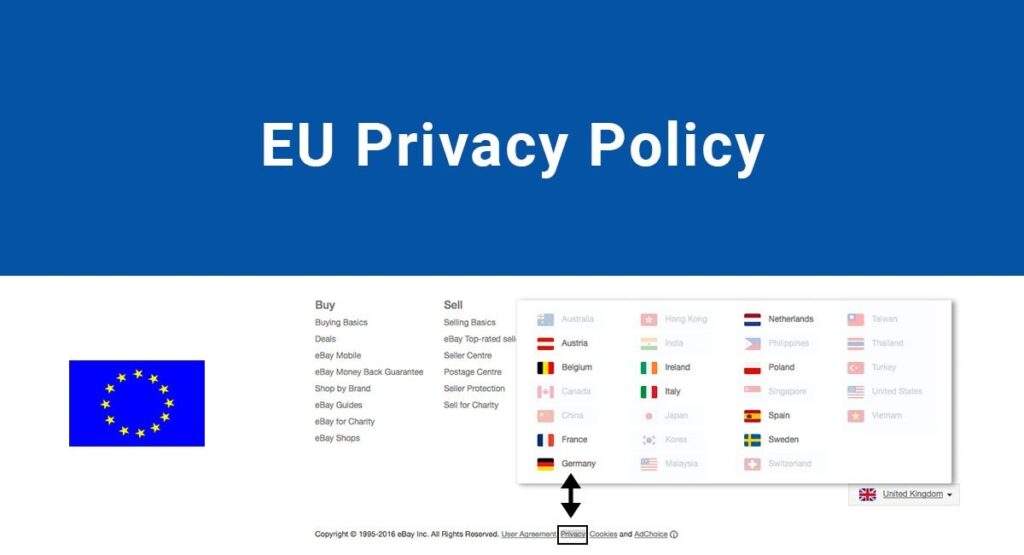US E-Commerce Companies in the Dark on European Privacy Rules

The U.S. Commerce Department is trying to work out an agreement that would help thousands of U.S. businesses comply with policies developed to protect the personal privacy of European residents. The department, and the European Commission, an arm of the European Union (EU), have initiated conversations to fix personal privacy issues raised by the EU, according to an August 10 joint declaration.
The reason for the settlements is that “Personal privacy Shield,” a Commerce Department program developed to secure the privacy of Europeans, has fallen apart. As a result of a legal challenge brought by Austrian personal privacy supporter Maximillian Schrems, an EU court ruled on July 16, 2020, that the U.S. Privacy Shield program was “invalid” since it failed to provide the requisite protection for European people.
Till the problems are solved, U.S. companies will be operating in a twilight zone over how to guarantee the privacy of individual data they gather and process electronically from European sources. More than 5,000 business take part in Privacy Shield, and the majority of them are small or medium-sized organizations.
The industrial effect of the EU decision is substantial.
“Cross-border information streams between the U.S. and Europe are the largest worldwide and are essential to the biggest trading relationship in the world, valued at around 1.3 trillion U.S. dollars every year,” according to a joint statement provided by the U.S. Chamber of Commerce and several e-commerce associations. The termination of Personal privacy Shield has “interrupted these transatlantic data flows” and has produced “legal unpredictability” for Privacy Guard individuals, the groups said.
“Data circulations are essential not just to tech business– however to organizations of all sizes in every sector,” stated U.S. Secretary of Commerce Wilbur Ross.
Why Are United States Companies in a Fix?
In the beginning look, the Personal privacy Guard seems a substantive legal framework. In reality, the relationship between the U.S. and European Economic Location (EEA) nations relating to personal privacy has remained in a vulnerable state for years. The EU court choice marked the second time in five years that a U.S.-Europe personal privacy structure had unwinded. A previous contract called the Safe Harbor Act, failed in 2015.
In basic, EEA nations signing up for the EU General Data Security Policy (GDPR) insist that nations beyond the EU supply a similar level of defense for individual information as that offered within the EU.
Under GDPR protocols, numerous types of compliance are allowed for the transfer of EU information outside the EU, according to an analysis supplied to the E-Commerce Times from the Better Service Bureau National Programs office. Privacy Shield made it possible for U.S. companies to meet among these, based upon what is called an “adequacy decision,” which is a decision by an EU regulator that a non-EU nation’s personal privacy laws are adequately robust to meet EU requirements.
By signing up under this single car and carrying out the needed privacy practices, U.S. companies were able to process the data of EU consumers in the United States. Also, the Personal privacy Guard differed from an alternative mechanism, referred to as Standard Contractual Stipulations (or SCC), because Privacy Guard supplied extra openness and responsibility requirements. Personal privacy Shield was also a broader compliance mechanism than a contract between two organizations, the analysis kept in mind.
The stumbling block between Europe and the U.S. was detailed by the EU Court. Europeans declare that U.S. law stops working to provide European citizens the exact same level of due procedure protection as U.S. residents relating to individual information that could be acquired by U.S. national security and police.
The result is that U.S. companies are caught in a crossfire between governmental entities. The European decision to invalidate the Privacy Guard “focuses not on commercial uses of information, however on concerns over prospective federal government access,” stated the U.S. Chamber of Commerce executive vice president Myron Brilliant.
Finding a Solution Postures Obstacles
While federal government entities attempt to exercise a service, U.S. businesses will need to deal with meeting GDPR requirements as finest they can. It will not be easy.
One option for U.S. businesses is to use information “localization” steps. These are “policies needing companies to shop and procedure data on servers physically situated within nationwide borders,” according to Albright Stonebridge Group.
A second choice is for U.S. businesses is to fall back on SCC arrangements. However, the EU choice made it harder to craft appropriate SCCs. Instead of utilizing somewhat general legal design templates, such agreements will now have to be far more specific depending upon private nation requirements and the nature and use of collected data.
The EU choice contained “substantial extra problems,” for U.S. business relating to both choices, according to Lisa Soto, a partner at Hunton Andrews Kurth.

“The only certainty is the total localization of information in the EEA. That is economically infeasible for a lot of companies, so they are scrambling now to put in place alternate services for information transfers if they were depending on Personal privacy Guard certifications to legislate transfers,” Soto told the E-Commerce Times.
“If companies were relying on SCCs, they now need to conduct a transfer risk assessment and possibly put additional safeguards in place. To state this is a mess is an understatement,” she added.
Some legal professionals compete that better file encryption will assist U.S. businesses and that the issue about national security firm access to data is somewhat constrained by U.S. law. The EU court choice has been carefully examined by legal specialists, with carefully nuanced analyses and interpretation of the ruling. However, that highlights the idea that preparing SCCs puts a significant legal and compliance problem on companies.
Making matters even riskier for U.S. companies is the contention that the EU court “cast doubt” on using SCCs, according to the BBB National Programs analysis. In reality, a couple of European regulators, understood as Data Security Authorities (DPAs), have already voiced concerns about the viability of SCCs.
“Uncertainty will be the standard for information transfers between the EU and the U.S. until European regulators clarify the requirements presented by the EU Court. There is also extra unpredictability for data transfers from the UK to the U.S. because Brexit goes into complete result at the end of the year,” stated Cobun Zweifel-Keegan, deputy director, Personal privacy Initiatives for BBB National Programs.
“The state of play after the Schrems decision is that all transfer systems acknowledged under EU law now require additional legal, functional, and technical actions in order to even have a possibility at being sufficient under the new requirements,” he informed the E-Commerce Times. “Until there is further clarity, organizations will continue to work to demonstrate their compliance to the finest of their capabilities, including by executing the kinds of practices needed by Personal privacy Shield,” he added.
Ongoing Settlements
While negotiations between the U.S. and Europe continue, the DoC will keep running Personal privacy Guard in hopes that discussions will result in practical modifications to the program. Any of the companies in the program can drop out, but that’s not a good idea, according to Soto, of Hunton Andrews Kurth.
“The Privacy Guard concepts continue to act as a strong framework for the defense of individual information. In addition, Switzerland continues to honor the Shield framework. Thus, it makes sense for companies to remain licensed to the Guard.
“Naturally, the hope is that diplomatic discussions will show effective, and companies that are Shield licensed eventually will have the ability to once again use the Guard as a system by which to lawfully transfer personal date from the EEA to the U.S.,” Soto noted.















